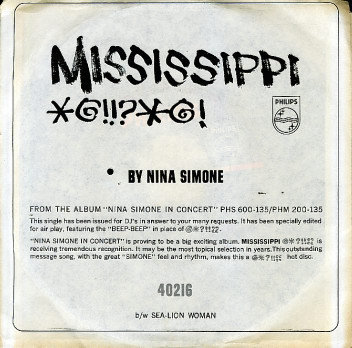Friday, October 6, 2017
True Stories: Mississippi Goddam
Nina Simone: Mississippi Goddam
[purchase]
When I decided to write about this song, I had no idea that a couple of days later, Nina Simone would be nominated for the Rock and Roll Hall of Fame. Simone is one of those prodigiously talented artists who is widely influential, but has, I think, sort of fallen out of the conversation because of the course of her career, and her long illness and death back in 2003. I’ll admit that I was one of those who had heard her name, was familiar with a few songs, but really knew very little about her until I watched the 2015 documentary about her, What Happened, Miss Simone?
What happened was a sad combination of being an outspoken, black civil rights activist a few years before it wasn’t a career killer, mental illness, spousal abuse and poor advice, which resulted in Simone leaving the public eye for years, just when her music and message would probably have been successful. And it is likely that “Mississippi Goddam” was the turning point in her career, for better and for worse. I recommend reading her bio somewhere, or seeing the movie (or one of the other movies about her that are out there).
The song was written by Simone, reportedly in an hour, as a reaction to both the killing of Medgar Evers in Jackson, Mississippi and the bombing of the 16th Street Baptist Church, in Birmingham, Alabama, about three months apart in 1963.
Evers, a World War II veteran, became a leading civil rights activist, ultimately becoming the NAACP field secretary for Mississippi, where he led efforts to desegregate schools, beaches, parks, buses and the state fair, while also leading voter registration drives. He became a particular target of the White Citizen’s Council, and Evers survived two assassination attempts in May and June 1963 before being gunned down in his driveway. He was taken to a white hospital, where he became the first African American patient admitted to an all-white hospital in Mississippi, but he died within an hour of admission.
Byron De La Beckwith, a member of the White Citizen’s Council, and later on, the KKK, was arrested and charged with the murder, but all-white juries would not convict the piece of crap. It was not until 1994 that he was convicted and imprisoned, and he died behind bars in 2001, at the age of 80.
Evers has become a member of the pantheon of civil rights martyrs, and in addition to Simone, songwriters such as Bob Dylan, and Phil Ochs have written songs about him (one of which, I featured in the second piece I ever wrote for this blog). He has a college named after him, statues of him have been erected, and stories, books and films have chronicled his life and death.
A few months after Evers’ shooting, some KKK cowards dynamited a black church in Birmingham, killing four girls, Addie Mae Collins (age 14), Carol Denise McNair (age 11) (a friend of Condolezza Rice), Carole Robertson (age 14), and Cynthia Wesley (age 14) and injuring 20 more. The death of these four young girls has been credited with opening the eyes of many to the need for change. That being said, although the FBI had identified suspects, J. Edgar Hoover blocked any prosecutions at that time. Three of the four murderers were convicted much later, one in 1977, one in 2001 and one in 2002. The fourth escaped prosecution by dying in 1994. Not surprisingly, this incident has been memorialized in song, writing, sculpture and film.
Simone’s song was first released in a live version, recorded at Carnegie Hall in 1964. While the music is jaunty, its lyrics are not, and the performance includes a few pointed asides from Simone. Although the song became an anthem for the civil rights movement, Simone believed that it damaged her career, and that the music industry turned against her. It isn’t one of those songs that singers trot out anymore when they want to hearken back to the civil rights era, maybe because it isn’t a great sing along, and that’s too bad.
I heard “Missisippi Goddam” on the radio the other day in the car, and I was struck by how Simone married what sounds like happy music with such angry lyrics. It wasn’t the impetus for this theme, but when I realized that it fit, I had to write about it.
Posted by Jordan Becker at 8:30 AM
Labels: Nina Simone, True Stories
blog comments powered by Disqus






























































































































































































































































































































































































